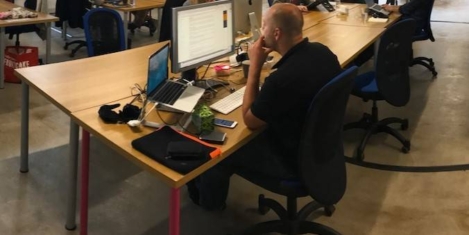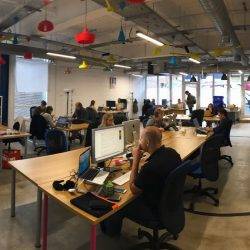February 12, 2018
New government campaign sets out to increase take up of shared parental leave
 A new government campaigned launched today encourages more parents to take up the offer of Shared Parental Leave in their child’s first year. The workplace right for eligible parents allows them to share up to 50 weeks of leave and 37 weeks of pay after having a baby. They can take time off separately or they can be at home together for up to 6 months. Around 285,000 couples every year are eligible but take up could be as low as 2 percent, according to the Department for Business, Energy & Industrial Strategy and around half of the general public are unaware that the option exists for parents.
A new government campaigned launched today encourages more parents to take up the offer of Shared Parental Leave in their child’s first year. The workplace right for eligible parents allows them to share up to 50 weeks of leave and 37 weeks of pay after having a baby. They can take time off separately or they can be at home together for up to 6 months. Around 285,000 couples every year are eligible but take up could be as low as 2 percent, according to the Department for Business, Energy & Industrial Strategy and around half of the general public are unaware that the option exists for parents.








 Most people who work in HR now recognise how essential technology is for delivering more strategic value to their organisation, but a new report suggests that HR teams are not prepared to meet the
Most people who work in HR now recognise how essential technology is for delivering more strategic value to their organisation, but a new report suggests that HR teams are not prepared to meet the 
 Concern amongst small and medium sized enterprises (SMEs) regarding the current economic climate fuelled by worries over a Brexit-related skills shortages, is at a three-year high, according to the latest Zurich SME Risk Index. It now sits at 56.38, indicating almost a 2 percent rise in perceived risk since Q1 2016 (55.43), and more than 3 percent higher than in October 2016 (54.55). SMEs attitudes towards economic growth, presently sits at a four-year low – with just two in five (40 percent) businesses confident that the UK economic situation will improve over the next 12 months. Similarly, the results regarding SMEs attitudes towards the international trade environment, reveals concern regarding overseas competition and currency rate fluctuations being at its highest in four years at 45.49. Equally, workforce challenges, namely the availability of skills and talent, is also an increasing concern for smaller businesses. Two in five (40 percent) SMEs now see workforce challenges as a major concern for their business; a rise of 8 per cent since October 2016, indicating that political issues are a major influence on the current attitudes of business owners in the UK.
Concern amongst small and medium sized enterprises (SMEs) regarding the current economic climate fuelled by worries over a Brexit-related skills shortages, is at a three-year high, according to the latest Zurich SME Risk Index. It now sits at 56.38, indicating almost a 2 percent rise in perceived risk since Q1 2016 (55.43), and more than 3 percent higher than in October 2016 (54.55). SMEs attitudes towards economic growth, presently sits at a four-year low – with just two in five (40 percent) businesses confident that the UK economic situation will improve over the next 12 months. Similarly, the results regarding SMEs attitudes towards the international trade environment, reveals concern regarding overseas competition and currency rate fluctuations being at its highest in four years at 45.49. Equally, workforce challenges, namely the availability of skills and talent, is also an increasing concern for smaller businesses. Two in five (40 percent) SMEs now see workforce challenges as a major concern for their business; a rise of 8 per cent since October 2016, indicating that political issues are a major influence on the current attitudes of business owners in the UK.


 The UK has been ranked as the eighth best country in the world for the ability to attract, retain, train and educate skilled workers, but while its ability to leverage diversity for talent competitiveness is boosted by its global knowledge skills – the UK is undermined by its weaker performance on tolerance and gender equality. According to the Global Talent Competitiveness Index GTCI) produced by the Adecco Group, with international business school INSEAD and Tata Communications, the UK has a particularly strong pool of global knowledge skills, a variable for which it is ranked third in the index boosted further by its strong regulatory, market and business landscape. But this is undermined by its internal openness, where it still lags behind, especially when it comes to gender equality. The report also suggests that although Article 50 was triggered in 2017, the ongoing negotiations and continuing lack of clarity over the UK’s position once it leaves the European Union in 2019, means the impact of Brexit is not yet clear.
The UK has been ranked as the eighth best country in the world for the ability to attract, retain, train and educate skilled workers, but while its ability to leverage diversity for talent competitiveness is boosted by its global knowledge skills – the UK is undermined by its weaker performance on tolerance and gender equality. According to the Global Talent Competitiveness Index GTCI) produced by the Adecco Group, with international business school INSEAD and Tata Communications, the UK has a particularly strong pool of global knowledge skills, a variable for which it is ranked third in the index boosted further by its strong regulatory, market and business landscape. But this is undermined by its internal openness, where it still lags behind, especially when it comes to gender equality. The report also suggests that although Article 50 was triggered in 2017, the ongoing negotiations and continuing lack of clarity over the UK’s position once it leaves the European Union in 2019, means the impact of Brexit is not yet clear.




 Managers are working an extra 44 days a year over and above their contracted hours, up from 40 days in 2015. These long hours are taking their toll, causing a surge in sick leave amongst managers suffering from stress and mental ill health, claims the Chartered Management Institute (CMI), which is calling on UK employers to provide greater support. Long hours and constant communication are having a detrimental effect on the wellbeing of managers it argues resulting in one in ten managers taking time off for mental health in the last year, and for those who do take time out, it’s for an average of 12 days. Of the 1,037 managers surveyed for the report, the average boss puts in an extra day each week. This is an extra 7.5 hours beyond their contracted weekly hours (44.4 hours actual compared to 37.3 contracted), adding up to an extra 43.8 days over the course of the year. This is up from 39.6 days in 2015. The rising gap between contracted and actual hours of work is in addition to an ‘always on’ digital culture, with 59 percent of managers saying they ‘frequently’ check their emails outside of work – up from 54 percent in 2015.
Managers are working an extra 44 days a year over and above their contracted hours, up from 40 days in 2015. These long hours are taking their toll, causing a surge in sick leave amongst managers suffering from stress and mental ill health, claims the Chartered Management Institute (CMI), which is calling on UK employers to provide greater support. Long hours and constant communication are having a detrimental effect on the wellbeing of managers it argues resulting in one in ten managers taking time off for mental health in the last year, and for those who do take time out, it’s for an average of 12 days. Of the 1,037 managers surveyed for the report, the average boss puts in an extra day each week. This is an extra 7.5 hours beyond their contracted weekly hours (44.4 hours actual compared to 37.3 contracted), adding up to an extra 43.8 days over the course of the year. This is up from 39.6 days in 2015. The rising gap between contracted and actual hours of work is in addition to an ‘always on’ digital culture, with 59 percent of managers saying they ‘frequently’ check their emails outside of work – up from 54 percent in 2015.













January 11, 2018
Culture shift needed to drive a better gender balance in property and construction
by Niki Fuchs • Comment, Property
More →